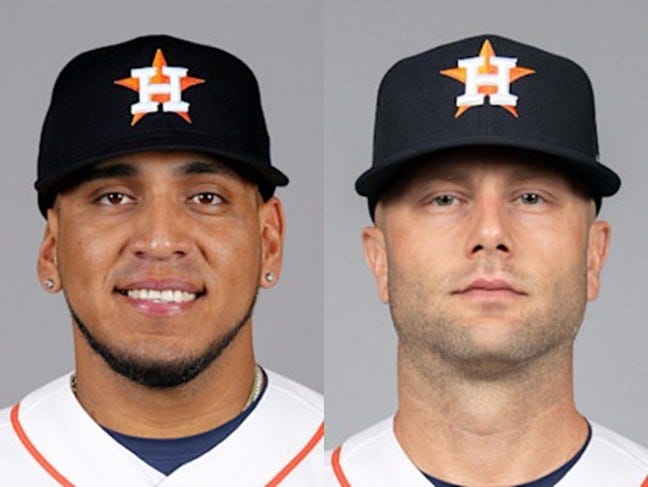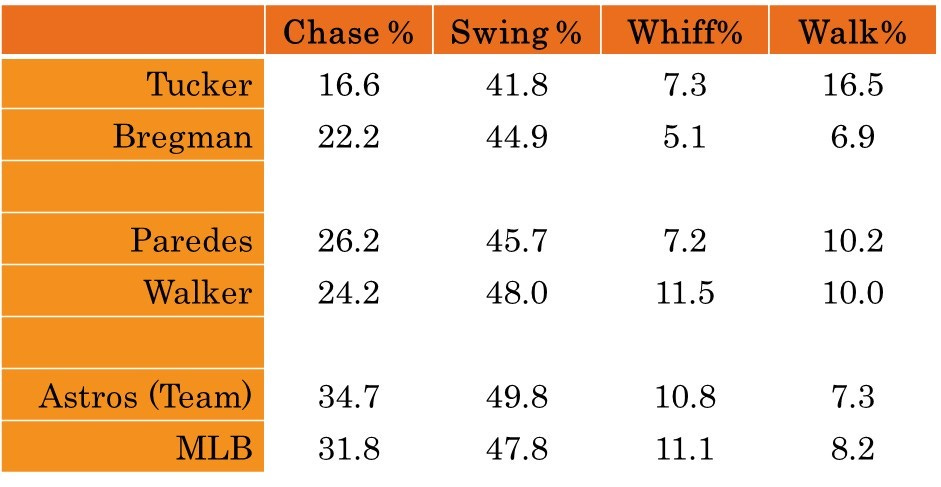Will Paredes and Walker Help the Astros Get Back Their Lost "Offensive Identity?"
The new additions to the lineup make better than average swing decisions. The problem is that they are replacing two hitters who make even better swing decisions.
In early December, I wrote about Joe Espada’s comment after the season ended that his team “kind of got away from our offensive identity” in 2024. I found that the 2024 Astros swung at pitches more often, chased pitches outside of the strike zone more often, whiffed more often, and walked less often than recent Astros teams.
I also tried to look at which hitters were causing these worrisome changes in swing decisions and the answer turned out to be “just about all of them.” It was essentially a team-wide issue, as just about every player who batted a lot in 2024 made worse swing decisions than they had in 2023.
There are two ways for the Astros to get back to their “offensive identity.” The first is for the Astros coaching still “to get the returning players to return to what they have done in previous years” in their strike zone judgment.
But there is a second way to change the team’s swing decisions—changing personnel. Since I wrote in early December, the Astros have made some major personnel moves that will alter the team’s lineup in 2025. The front office traded Kyle Tucker for Isaac Paredes (and others, but they won’t be in the everyday lineup in 2025) and signed free agent first baseman Christian Walker. In acquiring Paredes, a third baseman, and Walker, the Astros seem to all but officially close the door on Alex Bregman returning to the Astros in 2024.
The New Guys Make Worse Swing Decisions Than the Old Guys
Will these moves help the Astros to collectively make better swing decisions in 2025?
The answer to that seems to be no. To demonstrate that, I created the table below, which looks at four components of plate discipline for batters—Chase %, Swing %, Whiff %, and Walk %. Good batters chase less, swing less, whiff less, and as a result, walk more. In the ideal, a batter would only swing at strikes and only take balls.
The chart shows these rates in 2024 for the two outgoing members of the Astros batting order—Kyle Tucker and Alex Bregman—and the two incoming members—Isaac Paredes and Christian Walker. It also shows the league and Astros averages on all of these metrics from the 2024 season.
The chart indicates the new members of the lineup make worse swing decisions than the ones who are departing. Paredes and Walker both had higher chase rates and swing rates than did Tucker and Bregman in 2024. Paredes and Tucker swung and missed at essentially the same rate, but Walker whiffs a lot more than does Bregman. When it comes to walks, both Parades and Walker both had very good walk rates at 10.2% and 10.0% respectively. That’s better than Bregman’s poor rate in 2024 but well behind Tucker’s.
Overall, the additions of Walker and Paredes will not help the Astros make better swing decisions than the 2024 team that featured Tucker and Bregman
In some ways, that is not surprising. Kyle Tucker led all Astros hitters in OPS in 2024, which means good things happened when he swung the bat. Or when he decided to take pitches; Tucker led the Astros in walk rate in 2024. Bregman is a player with modest physical skills (for a major leaguer) but who maximizes those skills through things like good plate discipline.
Of course, some of the results from good plate discipline deteriorated for Bregman in 2024. His walk rate was over 11% in every season since 2017; in 2024, it declined to 6.9%. His swing and chase rates also reached highs not seen since the 2017 season. While Jim Crane’s reluctance to sign long term contracts is likely the biggest reason Bregman won’t be back with the Astros in 2025, the decline in his plate skills are likely another key reason for his departure.

The Silver Linings
There are two silver linings in Paredes and Walker’s plate discipline numbers. The first is that they are actually pretty good numbers. Both chase and swing less often than the average major leaguer or the average Astros in 2024. Paredes ran a lower whiff rate than average, and both walk more than the average major leaguer. There is every reason to think that they will be productive hitters in the lineup.
The second silver lining is that both Paredes and Walker made modest improvements in their swing decisions in 2024 compared to 2023. As the graph below shows, these were modest improvements, but both Paredes and Walker did better on all four metrics in 2024 than they did in 2023.
This improvement is notable because it is in contrast to these rates for those on the Astros in 2024. I examined these four metrics for a number of 2024 Astros in my previous article and found that “on all of these measures, just about every player moved in the wrong direction.”
So the fact that Paredes and Walker made improvements in their swing decisions in 2024 puts them in a different bucket than from their new teammates. It gives Astros fans some reason to hope that they will make positive contributions to better swing decisions by the team in 2025.
But overall, the two new members of the Astros lineup make worse swing decisions at the plate than the two members of the Astros lineup that are moving on. I concluded my previous article on the Astros strike zone judgment by writing “Internal improvement is the only way that the Astros will get back to their ‘offensive identity’ in 2025.”
Based on who is leaving and who is joining the Astros lineup this upcoming season, that conclusion still holds.





